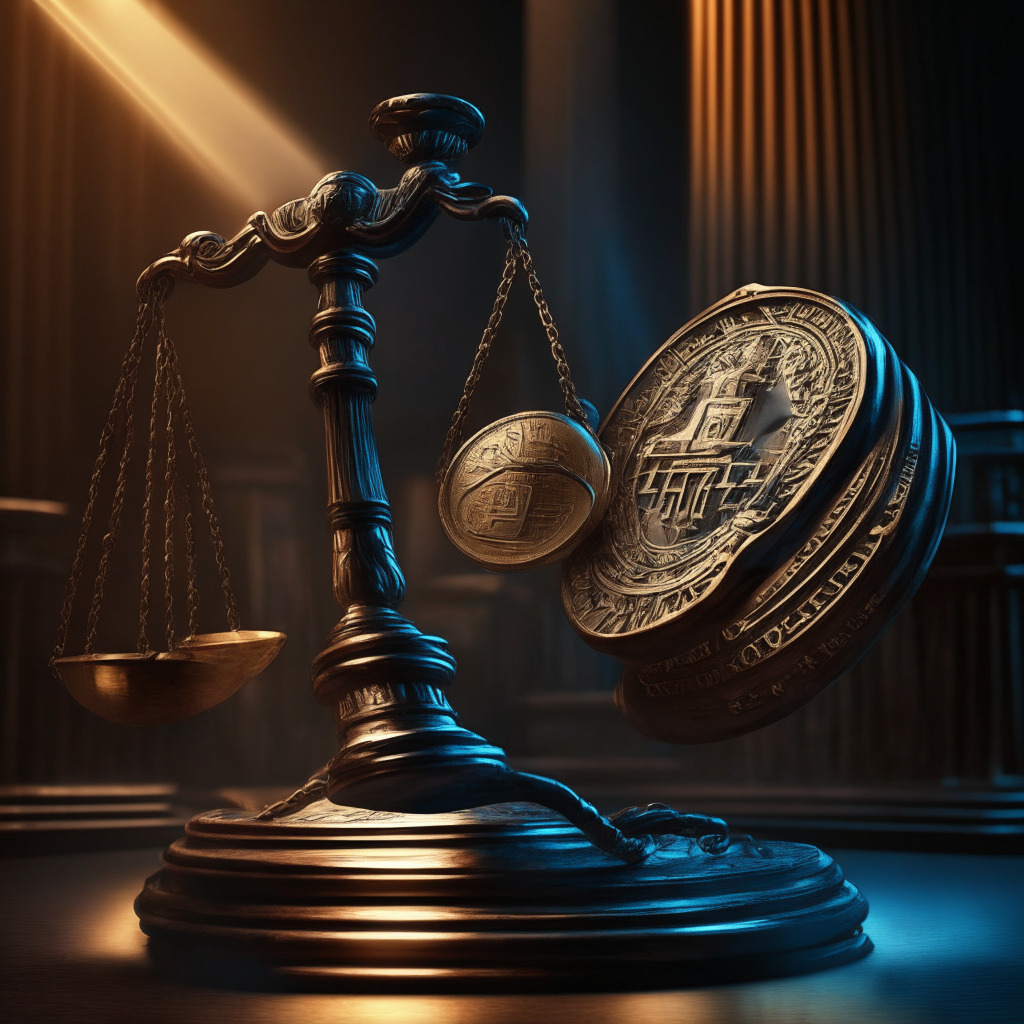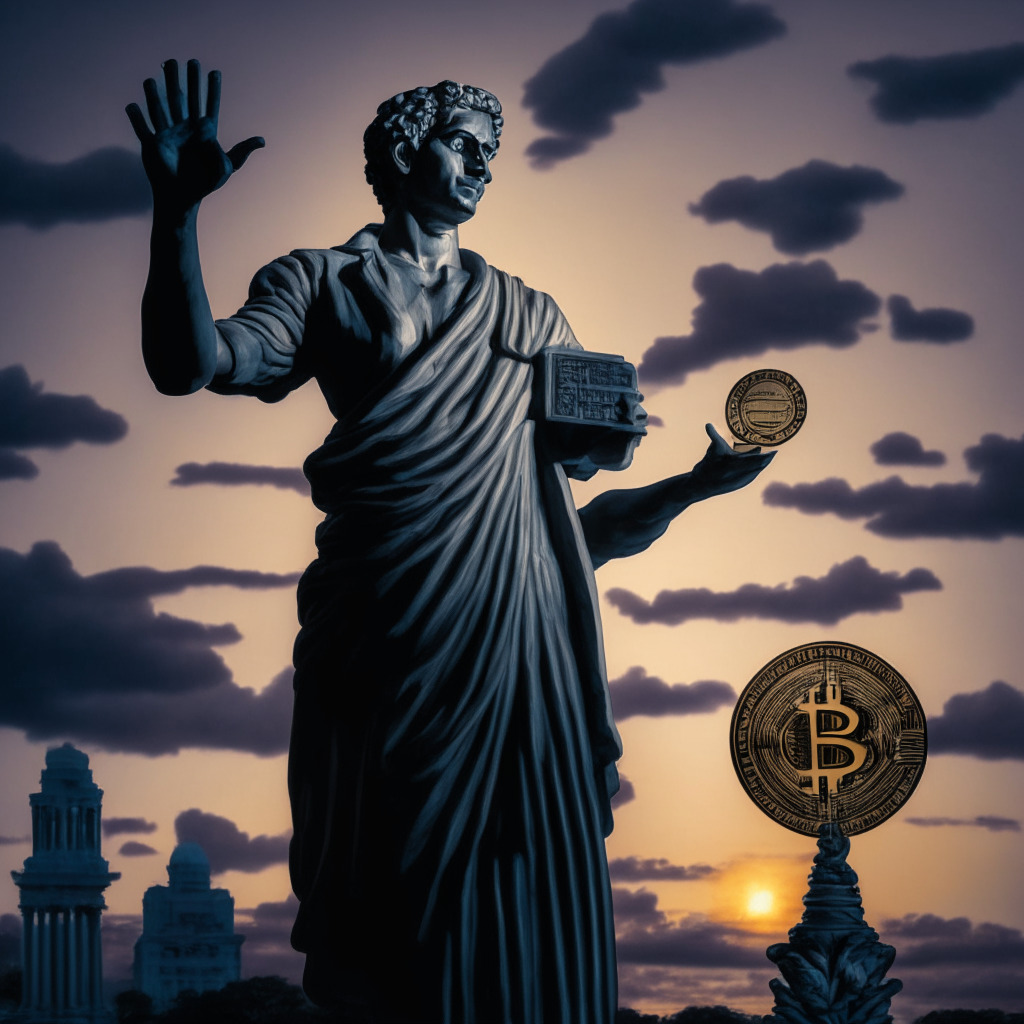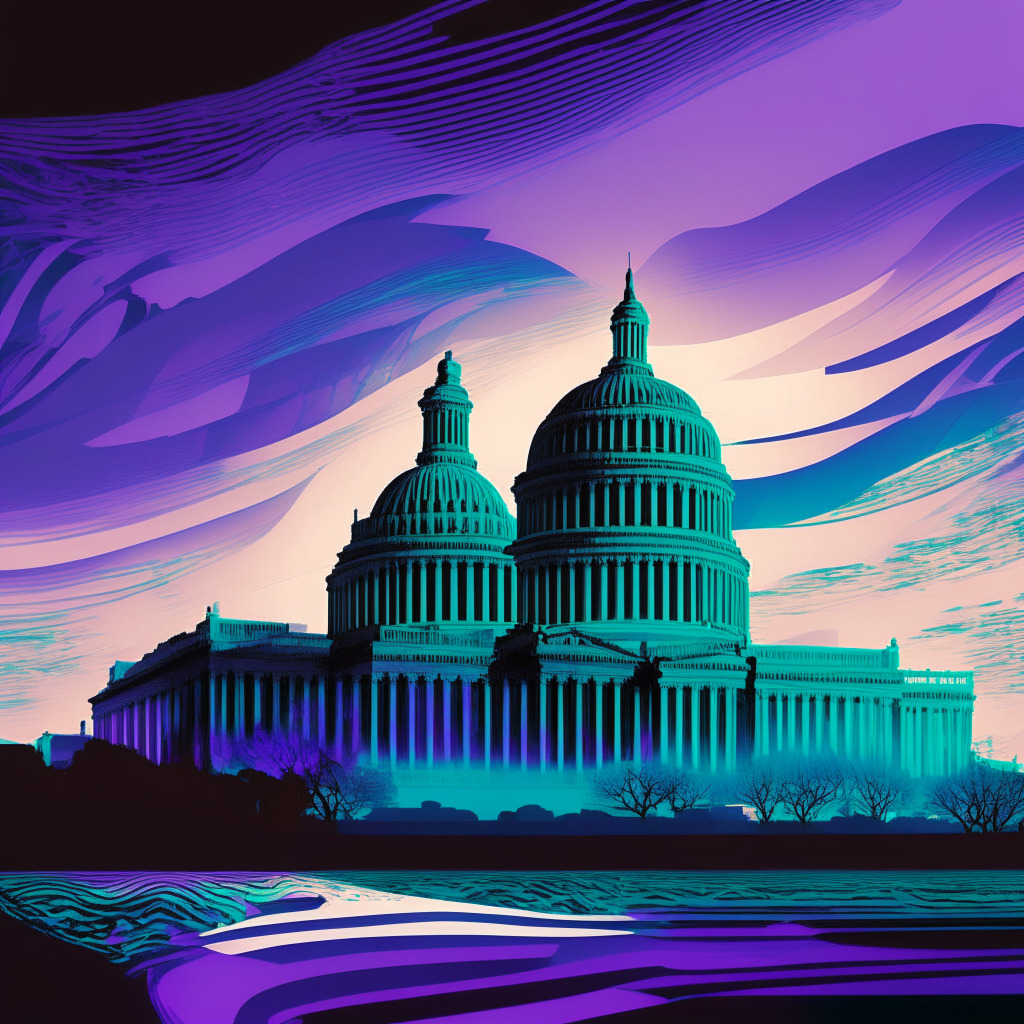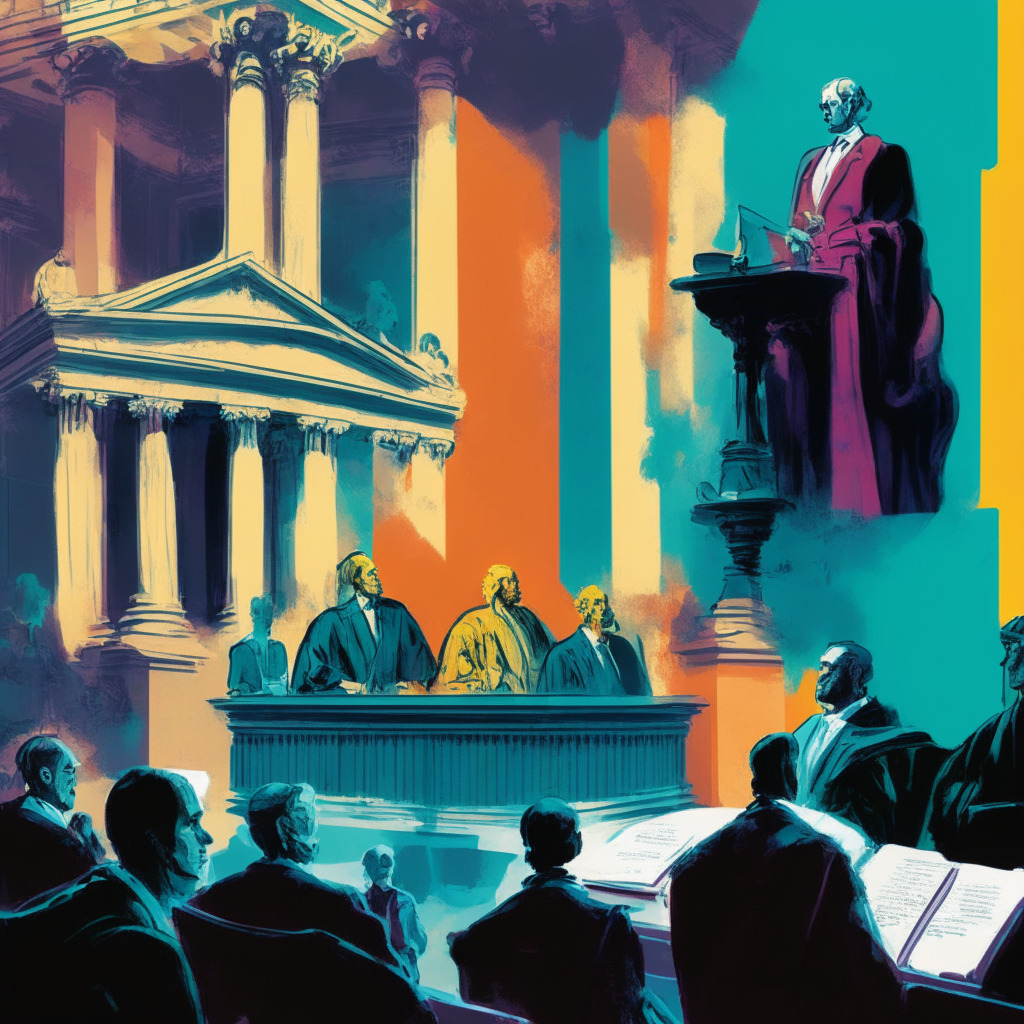The recent appointment of crypto-friendly interim House Speaker, Representative Patrick McHenry, has ignited hope for a progressive digital asset sector. However, uncertainties remain due to possible legislative changes, as his tenure could be short-lived, with potential transition of power affecting the future of crypto regulation.
Search Results for: U.S. Congress
Navigating the Regulatory Maze: Driving Stablecoin Legislation Under Biden’s Administration
Chair Patrick McHenry of the US House of Representatives’ Financial Services Committee affirms his commitment to regulate stablecoins. He steers two digital asset bills targeted at stablecoin regulation, and bringing clarity to the role between the CFTC and SEC. McHenry highlights potential bipartisan support and the global influence of dollar-denominated stablecoins, emphasizing complex power dynamics beyond the digital asset scope.
Unraveling the Crypto Carousel: SEC vs Binance, and the Circle Defence
The blog post discusses the legal fight between the SEC and cryptocurrency exchange Binance over the classification of digital assets as securities. It also touches on Circle’s argument that stablecoins linked to the U.S. dollar, such as BUSD and USDC, shouldn’t be categorised as securities. The outcome of the legal battle could greatly impact the future of cryptocurrency regulations.
SEC’s Bitcoin ETF Decision Delay: A Strategic Extender or Investor Protector?
The U.S. Securities and Exchange Commission (SEC) has postponed ruling on applications for spot Bitcoin exchange-traded funds (ETFs), including from big players like BlackRock and Invesco. This delay coincides with the possible U.S. government shutdown and its impact on SEC’s operations. Despite pointed SEC caution due to investor protection concerns, industry optimism for a Bitcoin ETF approval is rising.
Gary Gensler’s Regulatory Tightrope: Balancing Innovation and Regulation in Cryptocurrency
The SEC under Gary Gensler’s leadership has been accused of regulatory overreach, hampering the U.S. capital markets. While many criticize the lack of clear regulations around cryptocurrencies and other novel financial instruments, Gensler refrains from concrete classification, highlighting the complexity of these emerging issues.
Crypto Regulatory Suspense: SEC’s Stance, Stakeholder Worries, and an Uncertain Future
“The U.S. House Financial Services Committee may subpoena the SEC over undisclosed documents related to FTX’s former CEO. The Committee claims the SEC’s lack of cooperation is compromising transparency and hindering digital asset ecosystem growth. This case demonstrates how regulatory bodies are scrutinizing the digital asset industry.”
Crypto Progress: Are Pending US Bills at Risk Due to a Government Shutdown?
“The imminent US government shutdown threatens several crypto-focused bills awaiting a House vote, casting uncertainty over their fate. The longer the shutdown persists, the more delayed will be crucial crypto reforms. In this scenario, potentially causing regulatory stagnation in crypto markets.”
Global Crypto Regulatory Trends: A Challenge or an Opportunity?
Recent global legislative actions are intensifying cryptocurrency regulation discussions. Hong Kong is focusing on regulated exchanges to decrease fraud-related investor losses, Thailand is taxing overseas crypto profits, Brazil is advocating for digital assets protection, and the U.K. and U.S. are developing bills targeting illegal crypto use and curtailing Central Bank Digital Currencies respectively. Regulatory changes highlight the balance between encouraging financial innovation and protecting citizens.
Unraveling the Binance vs SEC Saga: A Landmark Battle in Crypto Regulation
Binance, Binance.US, and Changpeng Zhao are legally challenging the U.S. Securities and Exchange Commission, arguing it overstepped its bounds. The crux of the conflict lies in the question of whether the SEC has the right to retroactively regulate the emerging crypto markets. Binance contends that the SEC should have established clear crypto sector guidelines before taking legal action. They also challenge the SEC’s attempt to hold them accountable for crypto asset sales dating back to July 2017, during a time of unclear regulatory norms for crypto.
The CBDC Anti-Surveillance Act: Stunting Growth or Protecting Liberty in Crypto?
“The U.S. bill known as the ‘CBDC Anti-Surveillance State Act’ aims to prevent the Federal Reserve from issuing a central bank digital currency. This bill has sparked mixed emotions, with supporters seeing it as crucial for protecting personal liberties against state control, while critics argue it could stifle innovation and trust in digital currencies.”
Government Lens on AI: Lessons from the Crypto Industry’s Regulatory Travels
“John Rizzo suggests the AI sector should anticipate forthcoming scrutiny, much like cryptocurrencies. AI can learn from crypto’s challenges. While crypto tried to integrate into the highly regulated financial sector, AI targets multiple sectors, presenting a larger challenge.”
How US Regulations Can Spur Transparency In The Cryptocurrency Industry
“Senator Sherrod Brown has expressed concern about the cryptocurrency industry’s lack of self-regulation and transparency, predominantly benefiting insiders and executives. He urged key U.S. financial policy-makers to increase transparency and balance fostering innovation with protecting consumers in the crypto industry.”
Regulatory Tightrope: Striking Balance between Crypto Transparency and Investor Safety
U.S. Sen. Sherrod Brown’s call to regulators for promoting transparency and safeguarding investor interests suggests a push for stronger authority over digital assets. This results in questioning the readiness of the crypto enthusiasts to embrace potential regulatory changes in the crypto realm.
Decoding the AI Regulation Puzzle: Tech Titans Vs. Lawmakers on Navigating AI’s Future
“In a closed-door meeting, tech leaders including Elon Musk and Mark Zuckerberg stressed the urgent need for AI regulation. The discussions revolved around AI’s potential dangers and benefits, with skepticism about unregulated technology’s negative impact, yet belief in AI’s groundbreaking potential with careful monitoring.”
Failing or Succeeding? Evaluating The Blockchain Association’s Influence on Crypto Legislation
The Blockchain Association, a leading crypto trade association, continues to face skepticism and regulatory hurdles despite its five-year existence. With progress impeded by the fall of FTX and reduced support from congress members, the association’s efforts to pass comprehensive crypto legislation remain unsuccessful. Notwithstanding these setbacks, it has managed some victories in mitigating impacts of proposed regulations and supporting member companies. However, the future still presents significant obstacles, and crypto lobbyists are urged to remain humble about their “achievements.”
Blockchain’s Potential Role in AI Authentication and Its Legal Challenges in the US
“U.S. Rep. Tom Emmer suggests that blockchain technology could play a key role in authenticating AI-generated data, marking a significant intersection for blockchain and AI. Additionally, he signals potential policy distractions on digital assets, urging for innovative strides rather than legal controversies in cryptocurrency policies.”
Journey Towards a US Central Bank Digital Currency: A Rocky Path or a Road to Progress?
The U.S. is still in the “basic research” phase of developing a central bank digital currency (CBDC), according to Federal Reserve Vice Chairman, Michael Barr. He highlighted the importance of gaining backing from legislative bodies, addressing risks posed by stablecoins, and establishing a competent regulatory framework before proceeding with any initiatives.
Crypto Innovation Versus Regulation: The Hagerty-Gensler Faceoff
Sen. Bill Hagerty critiques SEC Chair Gary Gensler’s stance towards crypto, stating it stifles innovation and drives potential investors and companies overseas. He advocates for basic stablecoin regulations instead of comprehensive measures to improve the environment for U.S. crypto operations.
Pushing the Boundaries: Grayscale Urges SEC for Speedy Bitcoin ETF Approval Amid Rising Crypto Investments
Cryptocurrency investment manager Grayscale has petitioned the U.S. Securities and Exchange Commission (SEC) to expedite the conversion of Grayscale Bitcoin Trust (GBTC) into a Bitcoin exchange-traded fund (ETF). This follows a court reversal of a previous rejection of GBTC’s ETF bid, causing Grayscale to argue there’s no justifiable cause to deny their ETF application.
Deflecting the Blame: Uniswap Wins Case and Stirs Up Security Law Decisions in Crypto World
“A class action lawsuit against decentralized crypto exchange, Uniswap, was dismissed due to the unclear path for plaintiffs suing over alleged “scam tokens”. The judge argued that the issuers of these tokens were the culprits, not Uniswap. The case highlighted a legal quandary in identifying responsible parties amidst the anonymous, decentralized nature of crypto protocols, further clouding the jurisdiction and regulatory role of bodies like the SEC. The outcome implies that software creators could evade liability for misuse of their platforms.”
Habitual Delays on Bitcoin ETFs: The SEC’s Calculated Cautious Approach and its Impact on the Crypto Future
“The U.S. SEC has delayed decisions on Bitcoin ETF applications from several firms, requiring another 45 days minimum for further investigation. This triggers concerns about a longer wait for Bitcoin ETF authorizations, possibly as late as 2024.”
SEC Delays Bitcoin ETF Decisions: Cautious Maneuvers or Hindrance to Crypto Progress?
The U.S. Securities and Exchange Commission (SEC) recently extended the review period for Bitcoin ETF applications from six companies by 45 days, stirring anticipation in the crypto community. This move typifies the SEC’s consistent, cautious approach to digital assets, often resulting in procedural delays.
Court Ruling Throws Crypto Sphere into Disarray: ETH and BTC as Commodity vs Security
A New York district court dismissed a lawsuit against Uniswap, ruling that BTC and ETH are commodities, not securities. The court defended the decentralized nature of Uniswap, stating the investors’ claims would be better addressed to Congress, not the court. This ruling may influence future lawsuits against decentralized protocols.
Ramaswamy’s Support and Regulatory Challenges: Unraveling the Future of Cryptocurrency in the US
“U.S. Presidential candidate Vivek Ramaswamy praised Grayscale’s victory over the federal securities regulator, asserting it could further Bitcoin and blockchain innovation. However, the legal landscape for cryptocurrency regulation remains complex and uncertain, despite support from industry influencers and active discussions for clear regulations.”
Crypto Commodities: Bitcoin and Ether and their Legal Status in US Courts
U.S. District Court Judge Katherine Polk Failla recently referred to Ether and Bitcoin as “crypto commodities,” dismissing a lawsuit against decentralized exchange Uniswap. The legal classifications of cryptocurrencies continue to vary, with other digital currencies such as XRP classified as a security. Amidst conflicting views, U.S. lawmakers are yet to determine whether SEC or the CFTC will have authority over digital assets. Specialists suggest these legal classifications are crucial for creating a more organized and regulated crypto environment.
Redefining the Crypto Landscape: The Impact of US Court’s Ruling on Bitcoin ETFs
The U.S. Court of Appeals’ recent ruling criticizes SEC’s denial of a bitcoin spot-market ETF as “arbitrary” and “capricious”, fuelling hope for future acceptance. Grayscale Investments’ push for the Grayscale Bitcoin Trust’s transition into an ETF could force SEC to reconsider past rejections.
Navigating Uncharted Territory: A Comparative Analysis of Stablecoin Regulation Worldwide
“Recent news around CoinDesk and the temporary pause of their ‘Money Reimagined’ newsletter highlight the challenges faced by crypto media platforms. In this backdrop, a closer look at the regulatory landscapes shows varying global response to cryptocurrencies, notably stablecoins.”
The Ripple Effect of PayPal’s PYUSD: Potentially Forcing a Shift in Stablecoin Regulation Debate
The launch of PYUSD, a stablecoin backed by PayPal with over 430 million users, may accelerate crypto adoption and prompt a shift in U.S. policy towards crypto regulation. Despite previous hesitations, the massive user base might force lawmakers to urgently develop a comprehensive regulated framework for stablecoins, heralding a new era of American crypto companies demanding inclusion in economic life.
New Regulatory Landscape for Stablecoins: Balancing Investor Protection with Innovation
The Monetary Authority of Singapore (MAS) has unveiled a regulatory framework for stablecoins, providing guidelines for issuers on value stability, capital, and redemption. This move, which could bring security while potentially stifling small-scale startups, reflects a global trend in digital currency regulation.
Shifting Political Winds: Potential Impact on US Crypto Regulatory Landscape Post 2024 Election
Recent comments from former SEC official John Reed Stark suggest potential changes to U.S. crypto regulation influenced by party politics. Stark attributes a pro-crypto regulation shift to a possible Republican win in 2024, ending current SEC chair Gensler’s tenure, and potentially paving the way for Hester Peirce, known for her softer stance on crypto.
U.S Crypto Regulation: Balancing Innovation, Market Expansion and Legislative Oversight
Grayscale’s CEO expresses concerns about U.S. regulations potentially hindering innovation in the crypto sector. Hopes lie on recent legislation effort from Congress for clearer rules. However, concerns over the SEC’s ambiguous methodology for Bitcoin ETFs approval persist, questioning the sustainability of such products in the changing market.
Redefining Boundaries: SEC, Coinbase Lawsuit, and the Call for Crypto Regulation Reformation
U.S. Senator Cynthia Lummis and crypto experts assert that the SEC’s examination of crypto trading platforms, like Coinbase, as unregistered securities exceeds their jurisdiction. The SEC’s authority question, they believe, should rest with Congress. Much debate exists around immediacy and breadth of crypto regulation, with an emphasis on establishing comprehensive, globally mindful approaches to build trust in the market.































